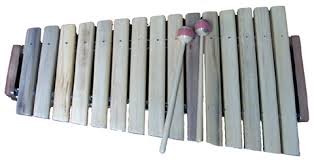
Sasando is a stringed musical instrument or cordophone type musical
instrument. It comes from the island of Rote, East Nusa Tenggara
Indonesia. The most southern island in Indonesia archipelago.
Sasando word comes from Rote word
sasandu. It means vibrant instrument. Sasando form is similar to other
stringed instruments such as guitar, violin and harp.
The main
part of the long tubular Sasando commonly made from bamboo. Then in the
middle, circling from top to bottom is placed some lumps in which the
strings that stretched across the tube, from top to bottom resting. The
wedge gives different tone to each passage of the string. Then this
Sasando tube placed in a container

Kolintang , music instrument originated from Minahasa, a place in
North Sulawesi, an island in the east part of Indonesia. It is made from
light but solid local wood such as
TELUR,
BANDARAN,
WENANG,
KAKINIK
whose fibre construction appears in parallel lines. It can produce a
long sound which can reach high pitch note as well as low pitch note
when struck.
The name Kolintang came from the sound: TONG (low pitch note), TING (high pitch note) and TANG (moderate pitch note). In the local language, the invitation “Let us do some TONG TING TANG” is: “Mangemo kumolintang”. That settled the name of the instrument: KOLINTANG.
In its early days, Kolintang originally consisted of
only a series of wooden bars placed side by side in a row on the legs of
the players who would sit on the floor with both of their legs
stretched out in front of them. Later on, the function of the legs was
replaced either by two poles of banana trunk or by a rope which hung
them up to a wooden plank. Story says that resonance box was beginning
to be attached to this instrument after DIPONEGORO, a prince from Java who was exiled to Minahasa, brought along Javanese instrument GAMELAN with its resonance box, GAMBANG.

Kolintang had a close relationship with the
Almost every where in Yogya, Solo, Semarang and other cities in Central
Java, in Karatons, in the market, in the villages, in the hotel's lobby,
you should hear the magical melodious percussion music - the gamelan Javanese orchestra.
In his book 'music of Java' Jaap Kunst says, "Gamelan is
comparable to only two things, moonlight and flowing water.
...mysterious like moonlight and always changing like flowing water
...".
Gamelan music is an integral part of all cultural activities in Java
such as wayang kulit (leather puppets) performance, court dance,
uyon-uyon (symphony orchestra performance), etc. There are two kinds of
laras (tuning) in gamelan, namely slendro (comparable to minor key in
Western music) and Pelog (major key). A complete set of gamelan consist
of two sets of different instruments of Slendro and Pelog, such as:
- Kendang (double ended drum beaten by hands)
It is a leading instrument. The pengendang (drumer) is the conductor of
the gamelan orchestra. There are five (5) different sizes of kendang
from 20 cm to 45 cm.
- Saron
A glockenspiel with bronze bar struck with wooden mallet. There are three kinds; Saron Barung, Saron Peking, Saron Demung.

- Bonang Barung
A double row of bronze kettles resting on a horizontal frame, played
with two long stick bound with red cord at the striking end.
As certification of angklung as the 4th
world’s Intangible Cultural Heritage from Indonesia, Pameran Purwa
Angklung Indonesia dedicated to introduce the treasure of angklung’s
rich culture to the world. It’s main aims are to expand the knowledge
about the history, development, function of angklung primarily to engage
with an international and national audience.
Dalam rangka peresmian Angklung sebagai warisan dunia tak benda
ke-4 asal Indonesia., Pameran Purwa Angklung merupakan upaya untuk
memperkenalkan khazanah budaya Angklung. Sekaligus untuk membuka
cakrawala mengenai sejarah, perkembangan, dan fungsi Angklung tidak
hanya bagi masyarakat Indonesia tetapi juga dunia.
Actually this blog is less still so, what do you think about content that must to be add? Please give your comments. Thank you for visiting.
 Sasando is a stringed musical instrument or cordophone type musical
instrument. It comes from the island of Rote, East Nusa Tenggara
Indonesia. The most southern island in Indonesia archipelago.
Sasando word comes from Rote word
sasandu. It means vibrant instrument. Sasando form is similar to other
stringed instruments such as guitar, violin and harp.
Sasando is a stringed musical instrument or cordophone type musical
instrument. It comes from the island of Rote, East Nusa Tenggara
Indonesia. The most southern island in Indonesia archipelago.
Sasando word comes from Rote word
sasandu. It means vibrant instrument. Sasando form is similar to other
stringed instruments such as guitar, violin and harp.








